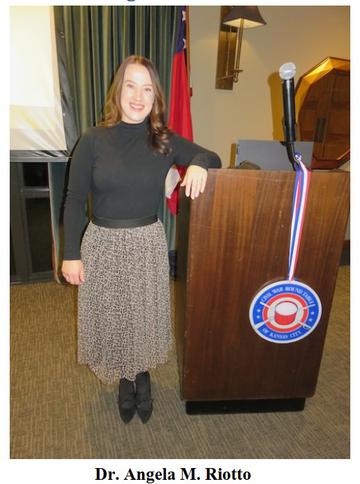January 2023 Meeting

At our dinner meeting on January 18th, Dr. Angela M. Riotto gave an excellent program titled: “American Civil War Prisoner of War in History and Memory.” Ms. Riotto received her Ph.D. from the University of Akron. Her research examines the ways in which both U.S. and Confederate former prisoners of war discussed their captivity between 1861 and 1930. She has published several articles and book chapters on her research. She currently teaches with the Department of Military History at the U.S. Army Command and General Staff College as an Assistant Professor.
Dr. Risotto’s program covered the following topics:
- Prisoner of war policy in early American history.
- Civil War prisoner of war policy.
- Wartime narratives.
- Overview of prisoner of war narratives.
Dr. Risotto said 410,000 men were held as prisoners of war during the Civil War. A total of 56,000 prisoners died during confinement. There was horrific treatment of prisoners during the Civil War.
Definition of Prisoners of War: POWs include almost anyone directly attached to an enemy army, to include individuals who arose in mass against an invader, civilians accompanying the army, diplomats, and chief officials of the enemy government.
During the Civil War, both sides planned to exchange prisoners. However, the Civil War was not a quick war. At first, prisoners were released if they signed an Oath of Parole. However, no formal exchange existed. At first the U.S. government refused to acknowledge the Confederate government.
There was a total of 1,300 prisoners at Bull Run and then 15,000 prisoners at Ft. Donelson. The problems were: What do you do with them? How do you guard them? There were some already-built Union prison facilities at Ft. Delaware, Ft. McHenry, and Point Lookout. The Confederates sent their prisoners to Richmond and Libby prison, which was an old tobacco warehouse. However, the prisons became over-crowded.
On July 22, 1862 Union Major General John A. Dix and Confederate Major General D. H. Hill met to work out a system for exchanging prisoners, in order to reduce over-crowding. This became known at the Dix-Hill Exchange Cartel.
On April 24, 1863, President Lincohi issued General Orders No. 100, known as the Lieber Code after its author, Professor Francis Lieber. This was the first modern codification of the Laws of War in order to mitigate the hardships of prisons. It became the foundation for the Geneva Convention in 1925. There was no formal prisoner of war camp until the Lieber Code. Once captured, the prisoners could not be intentionally harmed.
Even with the Lieber Code, Union and Confederate prisoners were low priorities. Lack of money and resources were a problem. Poor decisions led to a lot of deaths. Food went to soldiers in the field. Soldiers on active duty were allowed 4,000 calories per day. However, prisoners were only allowed 1,200 calories per day.
Civil War prisons became hell on earth. The mortality rate was much higher in prisons than from combat wounds on the battlefield. It was safer to fight than to be in prison.
Dr. Risotto discussed Confederate Camp Sumter, located near Andersonville GA in detail. (According to Wikipedia, a total of 45,000 Union prisoners were received and 13,000 died in captivity.) Dr. Risotto is writing a book about Confederate Captain Henry Wirz, who was the commandant of the prison. Wirz was executed after the war in November of 1865 for the crimes of conspiracy and murder. Dr. Risotto said Wirz was not as evil as he is portrayed. The prison guards were the real villains.
Many former prisoners published their experiences after the war. They also attended events and reunions. They wanted to be remembered and wanted to bring public awareness of the plight of prisoners. The general public was not aware of the mistreatment and suffering.
This was very interesting program and was well-attended. Attendance at the dinner meeting was 67.